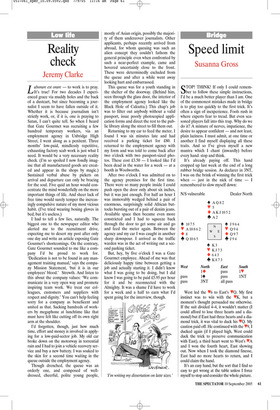Speed limit
Susanna Gross
STOP! THINK! If only I could remember to follow these simple instructions, I’d be a much better player than I am. One of the commonest mistakes made in bridge is to play too quickly to the first trick. It’s often a sign of inexperience. Fools rush in where experts fear to tread. But even seasoned players fall into this trap. Why do we do it? A mixture of nerves, impatience, the desire to appear confident — and not least, plain laziness. I must admit, at one time or another I find myself displaying all these traits. And so I’ve given myself a new mantra which I chant (inwardly) before every hand: stop and think.
It’s already paying off. This hand cropped up last week at the end of a long rubber bridge session. As declarer in 3NT, I was on the brink of winning the first trick when — just in the nick of time — I remembered to slow myself down: West led the r6 to East’s rQ. My first instinct was to win with the rK, but a moment’s thought persuaded me otherwise. If the suit divided 4–4, it wouldn’t matter (I could afford to lose three hearts and a diamond) but if East had three hearts and a diamond trick, it was vital to duck his rQ. My caution paid off. He continued with the r9, I ducked again (if I played high, West could duck the trick to preserve communication with East), a third heart went to West’s rA and I won the fourth heart, East showing out. Now when I took the diamond finesse, East had no more hearts to return, and I could claim the hand.
It’s an easy hand, but the sort that I find so easy to get wrong at the table unless I force myself to stop and consider the whole picture.
























































 Previous page
Previous page